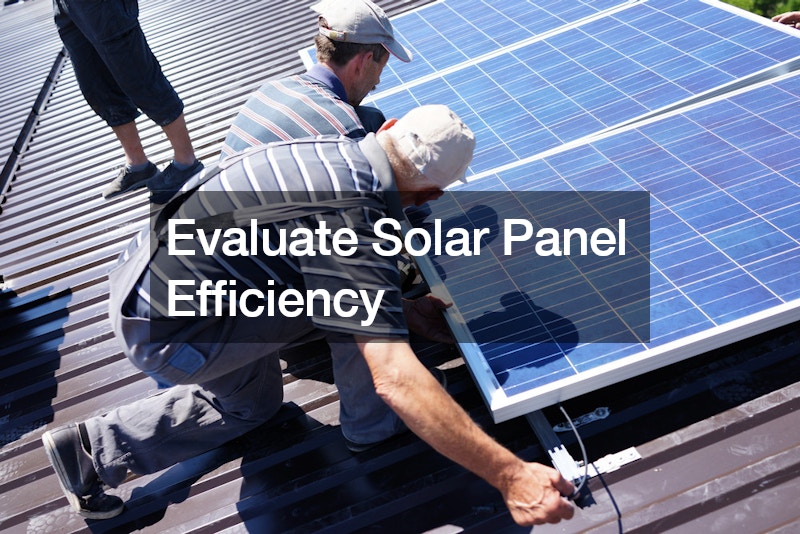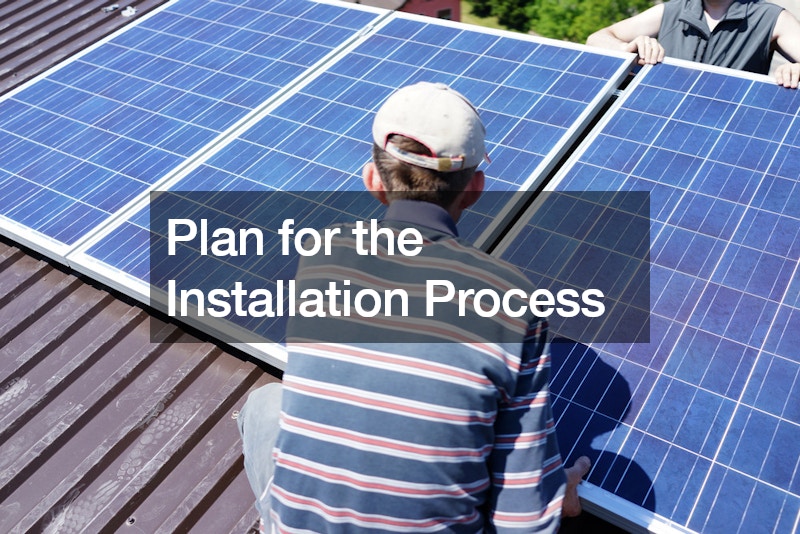As more people become aware of the environmental and financial benefits of solar energy, the demand for solar panel installations has significantly increased. Creating home energy solutions that are both efficient and eco-friendly has never been more important. This comprehensive guide aims to help you understand the different aspects involved in setting up solar panels for your home. From assessing your energy needs to choosing the best solar company, this article covers everything you need for a successful solar panel installation. We will delve into each crucial step, offering useful insights to make your transition to solar energy as seamless as possible.
Understand Your Energy Needs

The first step in creating home energy solutions that are both cost-effective and efficient is understanding your energy needs. Begin by reviewing your electricity bills over the past year to identify your average energy consumption. Knowing this will help you determine the size of the solar panel system you’ll need and, consequently, the cost.
It’s essential to engage with a reputable solar company to perform an energy audit. These companies utilize specialized tools and expertise to provide an accurate assessment of your energy requirements. The audit helps in tailoring home energy solutions to meet your specific needs, ensuring optimal utilization of solar energy investments.
Additionally, understanding your energy needs allows you to plan for future energy consumption. For instance, if you intend to create a home office or incorporate an electric vehicle, these additions will increase your energy usage. Proper planning ensures that your solar panel installation can effectively accommodate these future needs, maximizing long-term benefits and sustainability. This proactive approach also enhances the overall efficiency of your home energy system.
Moreover, seasonal variations in energy usage should be considered. Understanding how your energy needs fluctuate throughout the year helps in designing a solar panel system that can perform optimally in all conditions, ensuring consistent energy savings.
Assess Your Roof’s Suitability
Before installing solar panels for the home, it’s critical to assess your roof’s suitability. Factors like roof orientation, angle, and shading can significantly impact the efficiency of your solar panels. Ideally, your roof should face south and have minimal shading throughout the day to maximize solar energy absorption.
Creating home energy solutions through solar panels also requires your roof to be in good condition. If your roof is nearing the end of its lifespan, you may need to engage a roofing service before proceeding with the solar panel installation. This ensures the panels have a stable and long-lasting foundation.
Moreover, the available roof space plays a crucial role in determining the number of solar panels you can install. Consult with local roofers who specialize in both roofing services and solar installations to get a professional assessment. They can provide recommendations on optimizing your roof space for the best results.
Furthermore, consider the structural integrity of your roof. Ensure it can support the additional weight of solar panels and withstand local weather conditions over the panels’ lifespan.
Research Solar Panel Types
When it comes to solar panel installation, not all panels are created equal. There are primarily three types of solar panels: monocrystalline, polycrystalline, and thin-film. Each type has its own set of advantages and disadvantages, which makes researching them essential for creating energy solutions that meet your needs.
Monocrystalline panels are known for their high efficiency and longevity, making them an excellent choice for homes with limited roof space. Polycrystalline panels, while slightly less efficient, are more affordable and thus can be a good option if budget is a primary concern. Thin-film panels are less efficient but offer flexibility in installation, particularly on roofs that can’t support heavier panels.
To make the best choice, consult with a solar service provider who can explain the differences in detail. Understanding the efficiency, cost, and installation requirements of each type will help you in creating home energy solutions that are both effective and budget-friendly.
Additionally, consider the environmental impact of each panel type. Some panels require more energy to manufacture but may offer higher efficiency over their lifespan, leading to greater overall energy savings and reduced carbon footprint.
Evaluate Solar Panel Efficiency

Evaluating the efficiency of solar panels is crucial for creating energy solutions that are both effective and reliable. Solar panel efficiency measures how much sunlight a panel can convert into usable electricity. Higher efficiency panels may come at a higher initial cost but will generate more energy over their lifespan.
Check with the solar panel services you are considering to get detailed information on panel efficiency rates. Typically, monocrystalline panels offer the highest efficiency, followed by polycrystalline and then thin-film panels. The efficiency rate can range from 15% to 22%, and choosing the right panel will depend on your energy needs and budget.
Creating home energy solutions with high-efficiency panels can be particularly beneficial if your roof space is limited. Consult with a reputable solar service provider to get tailored advice based on your specific circumstances. They can offer insights on how to optimize the efficiency and placement of your panels for maximum energy production.
Furthermore, consider the impact of local climate conditions on panel efficiency. Panels in areas with abundant sunlight may benefit from higher efficiency models, while those in cloudier regions might prioritize durability and performance in lower light conditions.
Consider Warranty and Durability
When investing in solar panels for the home, warranty and durability are critical factors to consider. A good warranty can offer peace of mind, covering you against potential issues that may arise with your solar panels. Most manufacturers offer a 25-year performance warranty, ensuring that your panels will produce a specified amount of energy over their lifespan.
Durability is equally important as it affects the long-term viability of your solar investment. Panels should be able to withstand harsh weather conditions, including hail, heavy rain, and extreme temperatures. Creating home energy solutions that are built to last requires choosing panels made from high-quality materials and with robust construction.
Consult with solar panel services and review customer testimonials to get a sense of a product’s reliability. The best solar companies will offer comprehensive warranties that cover both the panels and the inverter. Ensuring you consider both warranty and durability will help you protect your investment in solar energy over the long term.
Additionally, inquire about the degradation rate of the panels over time. Understanding how much the panel’s efficiency may decrease over its lifespan due to wear and tear can help in making an informed decision about long-term maintenance and performance expectations.
Review Installation Costs and Financing Options
Understanding the costs associated with solar panel installation is crucial for home energy solutions that are both affordable and effective. Installation costs can vary widely based on factors such as the type of panels, the complexity of the installation, and your location. Get multiple quotes from different providers to compare costs and services thoroughly.
Financing options can make solar panel installation more accessible. Many companies offer financing plans that allow you to spread the cost over several years when hiring them for a roof service. Additionally, government incentives and tax credits can significantly reduce the overall cost. Be sure to explore all available options to find the best financial solution for your needs.
Remember to factor in the cost of any necessary roof service or upgrades. If your roof requires additional work, consult with local roofers to get accurate estimates. Understanding the full scope of costs involved in creating home energy solutions will enable you to budget more effectively and make informed decisions.
Moreover, the long-term savings associated with solar panel installation should be considered. While the initial costs may seem high, the reduction in monthly electricity bills and potential resale value increase of your home can provide substantial financial benefits over time.
Research Solar Panel Brands and Installers

Choosing the right brand and installer is key to creating energy solutions that are reliable and efficient. Researching solar panel brands can help you identify those known for high-quality products and excellent performance. Look for brands with strong customer reviews and long-standing reputations in the industry.
Equally important is selecting a reputable installer. Local roofers who specialize in solar installations can offer valuable insights and high-quality workmanship. Check credentials, certifications, and customer testimonials to ensure you’re working with a trustworthy provider. The best solar company will have a proven track record and robust customer support services.
Creating home energy solutions requires a collaborative approach between you and your installer. Good communication and transparency are essential for a smooth installation process. Don’t hesitate to ask questions and clarify any doubts before committing to a particular brand or installer.
Understand Solar Panel Inverter Options
The inverter is an essential component of any solar panel system, converting the direct current (DC) produced by the panels into alternating current (AC) for home use. There are several types of inverters to consider: string inverters, microinverters, and power optimizers. Each has its pros and cons, affecting the efficiency and reliability of your system.
String inverters are the most commonly used and are generally more affordable. However, if one panel underperforms, it can affect the entire system. Microinverters are installed on each panel, offering better performance and easier maintenance. Power optimizers work similarly to microinverters but are typically less expensive.
Consulting with a knowledgeable roofing company that specializes in solar panel installation can help you choose the best inverter for your needs. Understanding the differences between inverter options will assist you in creating home energy solutions that are both efficient and cost-effective.
Explore Monitoring and Maintenance
Once your solar panels are installed, ongoing monitoring and maintenance are crucial for ensuring their long-term efficiency and reliability. Many modern solar systems come with monitoring software that allows you to track energy production and consumption in real time. This helps identify any issues early and ensures optimal performance.
Regular maintenance checks are essential for creating home energy solutions that last. Schedule periodic inspections with your solar service provider to clean the panels and check for any potential issues. Routine maintenance can prevent minor problems from escalating into costly repairs.
Consult with roofing services to discuss maintenance plans and any additional warranties they might offer. Reliable local roofers can provide valuable advice on keeping your solar panels in top condition. A proactive approach to monitoring and maintenance will maximize the lifespan and efficiency of your solar energy system.
Furthermore, educate yourself on basic troubleshooting techniques. Knowing how to identify and address common issues, such as shading problems or inverter malfunctions, can help you maintain your solar panels effectively between professional maintenance visits.
Plan for the Installation Process

Planning for the solar panel installation process is key to ensuring a smooth and stress-free experience. Start by coordinating with your roofing contractor to schedule the installation at a convenient time. Make sure to discuss any specific requirements or preferences you may have.
Creating energy solutions through solar panels involves several steps, including permits and inspections. Your roofing company should handle most of these tasks, but it’s essential to stay informed and involved throughout the process. Clear communication between you and your installer can prevent misunderstandings and delays.
Once the installation is complete, take time to review the work with your contractor. Ensure everything meets your expectations and that you understand how to operate your new solar system. Proper planning and active participation will help you achieve the best results in creating energy solutions.
Additionally, the logistics of maintenance and monitoring post-installation should be considered. Discuss regular maintenance schedules with your installer and how to monitor the performance of your solar panels to ensure they are operating at peak efficiency.
Transitioning to solar energy is a wise investment for both your wallet and the environment. By thoroughly understanding each step, from assessing your energy needs to choosing the best solar company and maintaining your panels, you can ensure a successful solar panel installation. Creating home energy solutions that are efficient, reliable, and sustainable involves careful planning and informed decision-making. Remember to factor in the importance of good warranties, high-quality materials, and ongoing maintenance. Consult with trusted local roofers and service providers to gain the best insights and support throughout your solar journey. With thoughtful preparation and the right partners, you can make the most out of your solar investment, contributing to a greener future for all.

